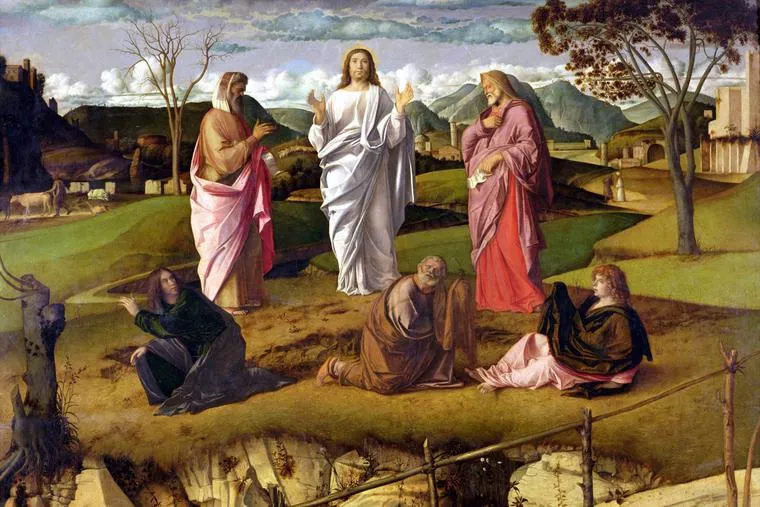This article explores why Jews do not accept Jesus as the Messiah, delving into the historical, theological, and cultural reasons that have shaped this longstanding perspective. Often rooted in deep-seated beliefs and interpretations of scripture, the rejection of Jesus as the Messiah highlights fundamental differences between Judaism and Christianity. By examining these aspects, we can gain a nuanced understanding of a debate that has influenced religious history for centuries.
Historical Background of Jewish Messianic Beliefs

The historical context of Jewish messianic expectations is essential to understanding why Jesus was not recognized as the Messiah by Jewish communities. This period was marked by political turmoil, religious upheaval, and a yearning for redemption, which influenced how messianic prophecies were interpreted. Far from being a static concept, the idea of a Messiah evolved over centuries, shaped by events in the Hebrew Bible and the socio-political realities of ancient Israel. This section examines how these historical factors contributed to a framework where Jesus’ life and claims did not align with prevailing Jewish expectations.
Ancient Messianic Prophecies in the Hebrew Bible

The Hebrew Bible contains numerous prophecies that Jews have traditionally interpreted as pointing to a future Messiah, but these interpretations often differ significantly from Christian readings. For instance, passages in Isaiah, such as Isaiah 53, which Christians frequently cite as foretelling Jesus’ suffering and death, are understood by Jews as referring to the nation of Israel itself or a righteous servant figure, not an individual messianic savior. This discrepancy arises because Jewish exegesis emphasizes collective redemption rather than individual atonement, viewing the servant songs as metaphorical representations of Israel’s historical struggles and ultimate vindication.
Moreover, prophecies in books like Daniel and Micah outline expectations of a messianic figure who would bring political liberation and restore the Davidic kingdom. Jews anticipated a leader who would defeat oppressors and establish a era of peace and justice, often tied to the rebuilding of the Temple and the ingathering of exiles. However, Jesus’ life, as recorded in the New Testament, did not fulfill these expectations in a literal sense—there was no widespread political victory or restoration of sovereignty under Roman rule. This mismatch between prophetic ideals and historical reality led many Jews to dismiss Jesus’ messianic claims, seeing them as unfulfilled or misinterpreted.
Additionally, the method of interpreting scripture in Judaism, known as midrash, involves creative and contextual readings that prioritize the ongoing narrative of the Jewish people. Unlike some Christian approaches that may view prophecies as predictive of specific events, Jewish tradition often sees them as aspirational or conditional, dependent on communal behavior and repentance. As a result, the failure of Jesus to bring about the prophesied peace and prosperity reinforced the view that he could not be the Messiah, highlighting a deeper interpretive divide that persists to this day.
The Second Temple Period and Messianic Hopes
During the Second Temple period, which spanned from the 6th century BCE to 70 CE, messianic hopes intensified amid foreign domination and internal conflicts. This era saw the Jewish people under Persian, Greek, and Roman rule, fostering a climate where messianic figures were often revolutionary leaders promising deliverance. Groups like the Maccabees, who led a successful revolt against the Seleucids, embodied this spirit, and their story, commemorated in Hanukkah, reinforced the expectation of a warrior-king Messiah.
Jesus emerged in this context, but his message of spiritual kingdom-building rather than military conquest did not resonate with many who sought a physical liberator. The destruction of the Second Temple in 70 CE by the Romans further dashed hopes for a messianic age, as it was seen as a sign that the prophesied redemption had not occurred. In this light, Jesus’ crucifixion was viewed not as a sacrificial triumph but as a defeat, failing to align with the messianic role of a victorious leader who would never die in such a manner according to traditional interpretations.
The period also gave rise to diverse Jewish sects, such as the Essenes and Pharisees, each with their own messianic interpretations. The Dead Sea Scrolls, for example, reveal expectations of a priestly and royal Messiah, contrasting with Jesus’ portrayal as a teacher and healer. This diversity meant that messianic claims were scrutinized against communal standards, and Jesus’ divergence from these norms contributed to his rejection. Ultimately, the historical turbulence of the time underscored the conditional nature of messianic fulfillment, making Jesus’ story incompatible with the lived experiences and hopes of many Jews.
Jewish Responses to Early Christianity
In the immediate aftermath of Jesus’ death, Jewish responses were largely dismissive or hostile, viewing early Christian movements as heretical offshoots. The apostles’ claims about Jesus’ resurrection and divinity were seen as contradictions to core Jewish tenets, such as the absolute oneness of God and the unchanging nature of Torah law. This led to debates and conflicts, documented in texts like the Acts of the Apostles, where Jewish leaders actively opposed the spread of Christianity.
Over time, as Christianity grew, Jewish communities developed formal responses in rabbinic literature. For instance, the Talmud contains discussions that critique Jesus’ adherence to Jewish law and question the validity of his miracles, often portraying him as a false prophet or magician. These writings were not merely reactive but part of a broader effort to define Jewish identity in the face of emerging religions, emphasizing fidelity to the covenant with God over new messianic claims.
The Bar Kokhba revolt in 132-136 CE, led by a figure proclaimed as the Messiah by Rabbi Akiva, further solidified Jewish resistance to accepting Jesus. When this revolt failed, it reinforced the idea that true messianic redemption had not yet come, contrasting sharply with Christian narratives. This historical trajectory shows that rejection was not arbitrary but deeply embedded in communal memory and theological continuity, shaping Jewish-Christian relations for millennia.
Theological Differences Between Judaism and Christianity


At the heart of why Jews do not accept Jesus as the Messiah are profound theological divergences that affect fundamental beliefs about God, scripture, and salvation. These differences stem from distinct interpretations of the same foundational texts, leading to incompatible worldviews. While Christianity emphasizes faith in Jesus as the incarnate Son of God and a path to eternal life through grace, Judaism focuses on ethical living, covenantal obedience, and the anticipation of a future Messiah who will fulfill specific prophecies. This section delves into how these theological chasms contribute to the ongoing rejection.
The Concept of God and Monotheism
Judaism upholds a strict monotheism, declaring God as indivisible and without partners, as stated in the Shema (Deuteronomy 6:4). In contrast, Christian doctrine introduces the Trinity, positing God as Father, Son, and Holy Spirit, which many Jews view as a form of polytheism
Theological Differences Between Judaism and Christianity


At the heart of why Jews do not accept Jesus as the Messiah are profound theological divergences that affect fundamental beliefs about God, scripture, and salvation. These differences stem from distinct interpretations of the same foundational texts, leading to incompatible worldviews. While Christianity emphasizes faith in Jesus as the incarnate Son of God and a path to eternal life through grace, Judaism focuses on ethical living, covenantal obedience, and the anticipation of a future Messiah who will fulfill specific prophecies. This section delves into how these theological chasms contribute to the ongoing rejection.
The Concept of God and Monotheism
Judaism upholds a strict monotheism, declaring God as indivisible and without partners, as stated in the Shema (Deuteronomy 6:4). In contrast, Christian doctrine introduces the Trinity, positing God as Father, Son, and Holy Spirit, which many Jews view as a form of polytheism.
The Jewish understanding of God is rooted in the belief that He is singular, unique, and transcendent, emphasizing His indivisibility. The Shema encapsulates this core tenet, establishing a clear boundary against any notion of multiple divine entities. This unwavering commitment to monotheism shapes Jewish identity and religious practice, reinforcing the idea that any deviation from this understanding undermines the very foundation of faith.
Conversely, Christianity’s interpretation of the Trinity presents a conceptual challenge for many Jews. The notion that Jesus is both fully human and fully divine raises questions about the nature of God and His relationship with humanity. For Jews, such duality clashes with their traditional teachings regarding God’s singular essence. This divergence in understanding leads to a significant theological rift, as Jews see the concept of the Trinity as incompatible with the biblical proclamation of an all-encompassing, singular deity.
Moreover, the implications of the Trinitarian belief extend beyond abstract theology; they influence the way adherents relate to God and understand divine authority. In Christianity, the personification of God through Jesus allows for personal relationships that some find appealing. In Judaism, however, the focus remains on the One, unapproachable God whose laws and commandments must be followed rather than a personal intermediary. This difference shapes the entire spiritual landscape of each faith, making reconciliation challenging.
Understanding Scripture and Revelation
Another critical point of divergence lies in the interpretation of scripture and the understanding of divine revelation. Judaism views the Torah—the first five books of the Bible—as the ultimate expression of God’s will, a guide for ethical living, and a covenant between Him and the Jewish people. On the other hand, Christians regard the New Testament as an essential continuation of divine revelation, asserting that it fulfills the prophecies and promises of the Hebrew Bible.
In Judaism, the process of interpreting scripture is dynamic and multifaceted, incorporating tradition, rabbinic commentary, and communal consensus. Each generation engages with the texts, extracting meaning relevant to their context while remaining anchored in the foundational principles of the faith. This method fosters a rich tapestry of thought and dialogue, allowing Judaism to adapt while maintaining continuity with its past.
Christianity, however, often holds to a more literal interpretation of the New Testament, viewing it as the definitive word of God that supersedes previous revelations. This framework positions Jesus not merely as a commentator on existing texts but as the embodiment of those texts—essentially redefining the meaning of prophetic writings from a Jewish perspective. This claim, especially concerning Jesus’ role as the anticipated Messiah, challenges traditional Jewish interpretations, which maintain that the Messiah has yet to come and has specific responsibilities that have not been fulfilled.
The emphasis on revelation also marks a crucial distinction in beliefs about salvation. For Christians, faith in Jesus and acceptance of his teachings are pathways to salvation. Judaism, in contrast, stresses observance of the mitzvot (commandments) and ethical behavior as means to cultivate a righteous life and strengthen one’s relationship with God. This difference in understanding salvation further complicates interfaith dynamics, as each side perceives the other’s approach as fundamentally flawed.
The Nature of Salvation and Redemption
The concept of salvation in Judaism significantly contrasts with Christian beliefs, particularly regarding the role of Jesus. For Christians, the death and resurrection of Jesus represent the ultimate act of redemption for humanity’s sins, offering believers salvation through faith alone. This salvific act is central to Christian doctrine, implying that acceptance of Jesus is necessary to attain eternal life.
In Judaism, however, salvation is largely understood in communal terms, focusing on collective repentance and adherence to God’s commandments. The Jewish perspective emphasizes that redemption is tied to ethical conduct, social justice, and fulfilling the obligations of the covenant established between God and the Jewish people at Sinai. This community-centered view fosters a sense of shared responsibility among individuals, highlighting the importance of actions over beliefs.
Additionally, Judaism looks forward to a future Messianic age characterized by peace, justice, and global harmony—a time when all nations will recognize God and live in accordance with His ways. This vision of redemption differs sharply from the Christian portrayal, as Jews do not see the messianic era as already fulfilled through Jesus. Instead, they anticipate a future figure who will restore Israel, rebuild the Temple, and bring about universal peace.
This hopeful outlook underscores a vital aspect of Jewish faith: the belief in an active, engaged God who interacts with humanity through history. The disappointment surrounding Jesus’ crucifixion is magnified within this framework, as his death did not lead to the fulfillment of these long-held expectations. The contrasting views on salvation highlight deep-seated theological divides and reveal the challenges each faith faces in bridging their narratives.
Conclusion

The reasons behind Jewish rejection of Jesus as the Messiah are complex and multifaceted, rooted in historical, cultural, and theological contexts. Distinct interpretations of scripture, differing conceptions of God, and divergent views on salvation illuminate the profound chasm between Judaism and Christianity. As each tradition continues to evolve, these differences remain pivotal in shaping the identities of both religions. By understanding the nuances of these beliefs, we can foster deeper dialogues and promote greater respect for the rich tapestry of faith that exists within our diverse world.

GIPHY App Key not set. Please check settings